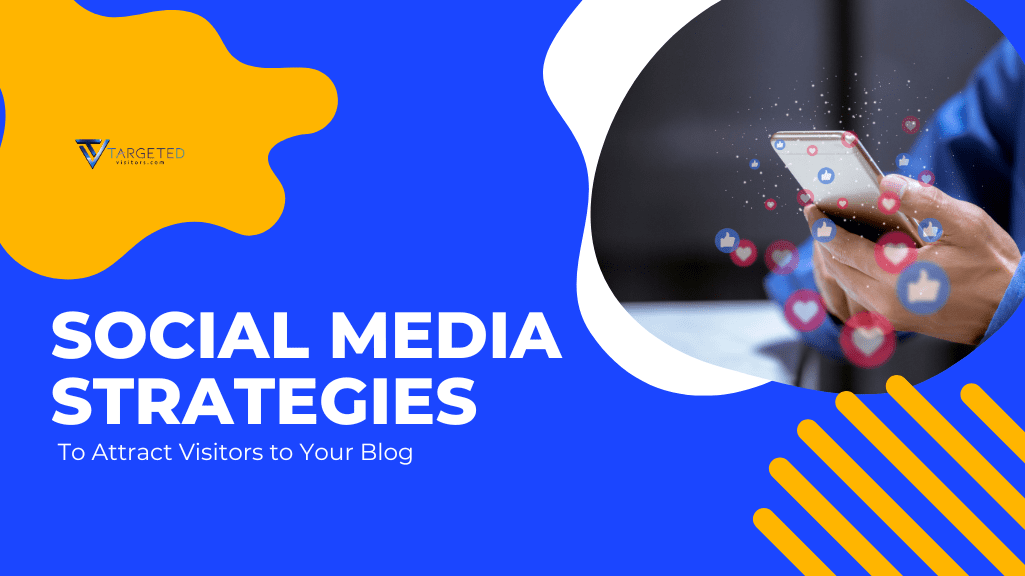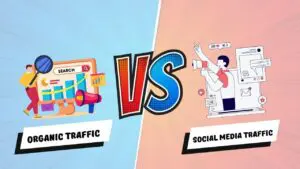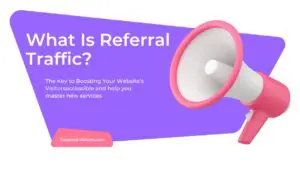In today’s digital landscape, where attention spans are fleeting and competition for online visibility is fierce, it’s crucial for bloggers and website owners to leverage the power of social media to drive targeted traffic to their content.
Whether you’re launching a brand new blog or looking to revitalize an existing one, mastering the art of social media engagement can be the difference between a virtual ghost town and a thriving, vibrant community.
Contents
- 1 Unlocking the Potential of Social Media for Blog Traffic
- 2 1. Optimize Your Social Media Profiles for Maximum Impact
- 3 2. Develop a Cohesive Social Media Marketing Strategy
- 4 3. Create Shareable, Value-Driven Content
- 5 4. Leverage Paid Social Media Advertising
- 6 5. Engage with Your Audience in Real-Time
- 7 6. Leverage Influencer Partnerships and Collaborations
- 8 7. Analyze and Iterate Your Social Media Strategies
Unlocking the Potential of Social Media for Blog Traffic
Social media Website traffic (Visitors & Targeted) Provider platform have revolutionized the way we consume and share information, presenting a unique opportunity for bloggers to reach and engage with their target audience.
By harnessing the power of these dynamic channels, you can not only increase your blog’s visibility but also cultivate a loyal following that will keep coming back for more.
1. Optimize Your Social Media Profiles for Maximum Impact
Your social media profiles serve as the digital face of your blog, so it’s essential to ensure they are optimized to capture the attention of potential visitors. Start by crafting a compelling bio that clearly communicates your blog’s purpose and value proposition. Utilize relevant keywords throughout your profile to improve searchability and make it easy for users to find your content.
Showcase Your Expertise
In addition to your bio, leverage the various sections of your social media profiles to showcase your expertise and the unique value your blog offers.
Share a brief overview of your blog’s core topics, highlight your most popular or impactful posts, and consider including a call-to-action that encourages users to visit your site.
Leverage Visuals to Stand Out
Social media is a highly visual medium, so be sure to incorporate eye-catching imagery and graphics into your profile. This could include your blog’s logo, featured images from your content, or custom-designed social media banners that reinforce your brand identity.
2. Develop a Cohesive Social Media Marketing Strategy
Successful social media engagement for your blog requires a well-thought-out strategy that aligns with your overall marketing objectives. Begin by defining your target audience and the social platforms where they are most active. This will help you tailor your content and messaging to resonate with your ideal readers.
Establish Clear Goals and Metrics
Set specific, measurable goals for your social media efforts, such as increasing referral traffic to your blog, growing your follower count, or generating more email subscribers.
Regularly track and analyze your performance against these metrics to refine your strategy and ensure you’re making the most of your social media investments.
Leverage Automation and Scheduling Tools
To maintain a consistent presence on social media, consider leveraging automation and scheduling tools to streamline your content publishing. This will allow you to plan and queue up your posts in advance, ensuring a steady stream of fresh, engaging content for your followers.
3. Create Shareable, Value-Driven Content
At the heart of any successful social media strategy lies the creation of high-quality, shareable content that provides genuine value to your audience.
Identify the topics and formats that resonate most with your readers, and use this insight to guide your content creation process.
Leverage Visuals and Multimedia
In addition to well-written blog posts, incorporate visually appealing elements such as images, infographics, and videos into your social media content. These formats tend to perform better in terms of engagement and shareability, helping to increase the visibility of your blog.
Encourage User-Generated Content
Invite your followers to participate in the conversation by encouraging them to share their own experiences, questions, or thoughts related to your blog’s content.
This not only fosters a sense of community but can also lead to the creation of user-generated content that you can then amplify across your social channels.
4. Leverage Paid Social Media Advertising
While organic social media efforts can be highly effective, sometimes a little extra boost is needed to reach a wider audience and drive targeted traffic to your blog. Explore the paid advertising options available on platforms like Facebook, Instagram, and LinkedIn to target specific demographics, interests, or behaviors.
Optimize Your Ads for Maximum Impact
When creating social media ads, focus on crafting compelling, visually striking creatives that capture the essence of your blog’s content. Experiment with different ad formats, messaging, and targeting strategies to determine what resonates best with your audience.
Track and Analyze Your Ad Performance
Regularly monitor the performance of your social media ads, tracking key metrics such as click-through rate, conversion rate, and cost-per-click. Use these insights to refine your ad campaigns and ensure you’re getting the most value from your advertising investments.
5. Engage with Your Audience in Real-Time
Social media is all about fostering meaningful connections, so it’s essential to actively engage with your followers and respond to their comments, questions, and interactions. This not only helps to build trust and loyalty but can also lead to increased referral traffic to your blog.
Respond Promptly to Inquiries and Mentions
Make it a priority to respond to any mentions, comments, or direct messages from your followers in a timely manner. This demonstrates your commitment to providing excellent customer service and shows your audience that you value their engagement.
Participate in Relevant Discussions and Communities
Beyond your own social media channels, seek out opportunities to engage with your target audience in relevant online communities, such as industry-specific Facebook groups or LinkedIn forums.
Contribute thoughtful, valuable insights that position you as an authority in your niche and encourage users to visit your blog for more in-depth content.
6. Leverage Influencer Partnerships and Collaborations
Collaborating with relevant influencers or industry peers can be a highly effective way to expand your blog’s reach and attract new visitors.
Whether it’s a guest post, a joint webinar, or a social media takeover, these partnerships can introduce your content to a fresh, engaged audience.
Identify Influential Voices in Your Niche
Start by researching and identifying the most influential individuals or brands within your blog’s niche. Look for those with a strong social media presence, a loyal following, and a reputation for producing high-quality, relevant content.
Craft Mutually Beneficial Partnerships
When reaching out to potential collaborators, focus on proposing ideas that offer value to both parties. This could involve cross-promoting each other’s content, co-creating a piece of content, or even hosting a joint event or giveaway.
7. Analyze and Iterate Your Social Media Strategies
Effective social media marketing for your blog is an ongoing process of testing, measuring, and refining your approach. Regularly review your performance metrics, gather feedback from your audience, and make adjustments to your strategies based on what’s working best.
Leverage Data-Driven Insights
Utilize the built-in analytics tools provided by social media platforms, as well as any third-party tools you may have access to, to gain a deeper understanding of your audience’s behavior and preferences. This data can inform your content planning, posting schedules, and overall social media strategy.
Continuously Adapt and Innovate
The social media landscape is constantly evolving, so it’s essential to stay up-to-date with the latest trends, algorithms, and best practices. Be open to trying new content formats, experimenting with different engagement tactics, and exploring emerging social media channels that may be a good fit for your blog.
By implementing these seven social media strategies, you can effectively drive targeted traffic to your blog and build a loyal, engaged following that will help amplify your content and contribute to your overall online success.
Remember, consistency, creativity, and a commitment to providing value to your audience are the keys to unlocking the full potential of social media for your blog.
How SERPs Can Impact Social Media Strategies to Attract Visitors to Your Blog
Increased Visibility
- Higher SERP Rankings: Blogs that rank higher on SERPs are more likely to be clicked by users searching for relevant topics. This increased visibility can lead to more organic traffic, which can be further amplified when shared on social media.
- Discoverability: When your blog posts are easily discoverable through search engines, they have a better chance of being picked up and shared by users on social media platforms, expanding your reach.
Credibility and Trust
- Perceived Authority: Content that ranks well on SERPs is often seen as more authoritative and trustworthy. Sharing such high-ranking content on social media can enhance your blog’s credibility, encouraging more users to visit and share your content.
- User Trust: Social media users are more likely to engage with and share content that appears credible, leading to increased referral traffic to your blog.
Keyword Strategy
- Keyword Insights: SERP analysis provides valuable insights into the keywords that drive traffic to your blog. Incorporating these keywords into your social media posts can improve their visibility and engagement.
- Targeted Content: By understanding which keywords perform well, you can create targeted social media content that resonates with your audience, driving more visitors to your blog.
Content Optimization
- SEO and Social Media Synergy: Optimizing your blog content for SEO ensures it is also optimized for social media sharing. Well-optimized content is more likely to attract clicks, shares, and comments, increasing traffic to your blog.
- Engaging Content: High-quality, optimized content tends to be more engaging, which can lead to higher social media interaction and more visitors to your blog.
Enhanced Engagement
- Informative Content: Content that ranks high on SERPs is typically informative and valuable, leading to higher engagement rates when shared on social media. Engaging content attracts more visitors and encourages them to explore your blog further.
- User Interaction: Increased engagement on social media can lead to more comments, shares, and likes, boosting your blog’s visibility and attracting new visitors.
Cross-Promotion
- Popular Content Promotion: Use SERP data to identify your most popular blog posts and promote them across your social media channels. Highlighting top-performing content can attract more visitors and increase your blog’s overall traffic.
- Strategic Sharing: Share high-ranking blog posts at optimal times on social media to maximize reach and engagement, driving more traffic to your blog.
Analytics Integration
- Comprehensive Insights: Combining SERP analytics with social media metrics provides a holistic view of your content’s performance. Understanding how your blog posts perform on search engines and social media helps refine your strategies.
- Data-Driven Decisions: Use integrated analytics to make informed decisions about content creation and promotion, ensuring your strategies are effective in attracting visitors to your blog.
Social Proof and User-Generated Content
- Social Proof: High SERP rankings act as social proof, indicating that your blog is a trusted source of information. Sharing such content on social media can further enhance this perception.
- User-Generated Content: Encourage your audience to create and share their content related to your blog. User-generated content can improve your SERP rankings and drive more traffic to your blog through social media visitors shares.
Local SEO and Geo-Targeting
- Localized Content: If your blog targets specific geographic locations, optimizing for local SEO can improve SERP rankings for those regions. Sharing localized content on social media can attract visitors from your target areas.
- Geo-Targeted Social Media Ads: Use geo-targeted ads on social media to promote your high-ranking blog posts to specific locations, driving targeted traffic to your blog.
By understanding and leveraging the impact of SERPs on your social media strategies, you can create a comprehensive approach that attracts more visitors to your blog, enhances engagement, and boosts your overall online presence.
Bonus Tip: Explore Paid Promotion (Maybe): While organic growth is ideal, social media advertising can be a powerful tool to jumpstart your audience. Consider running targeted ads on various platforms to reach a wider audience. However, it’s important to tread carefully. Start small, track your results closely, and ensure your content is high-quality to convert those clicks into loyal readers.






